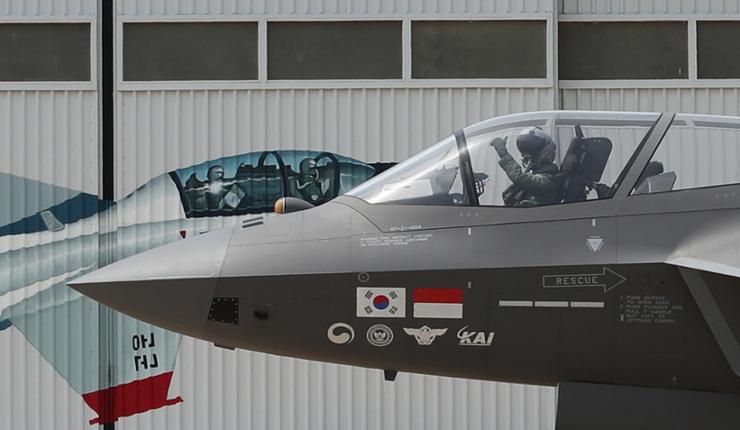
A prototype of the KF-21 fighter jet prepares for a test flight at the headquarters of Korea Aerospace Industries (KAI) in Sacheon, South Gyeongsang Province, May 9, 2023. Joint Press Corps
Doubts grow over defense partnership with Jakarta
By Nam Hyun-woo
Indonesia proposed paying only around a third of the initially agreed cost to jointly develop a next-generation fighter jet with Korea, according to defense industry sources, Monday.
Instead, the Southeast Asian country suggested that it would only accept a limited level of technology transfer for the KF-21 fighter jet, raising greater concerns about the deal that was once hailed as a symbol of the partnership between the two countries.
According to the sources, Indonesian military officials recently presented this proposal to their Korean counterparts at the Defense Acquisition Program Administration (DAPA).
A DAPA official said they are in the “final stage of negotiations with the Indonesian counterpart on the method of sharing costs for the KF-21 project.” However, the official neither confirmed nor denied the specific details of the proposal.
Korea and Indonesia signed a deal in 2016 to collaborate on the joint development project with Jakarta committed to funding by 2026 1.7 trillion won ($1.25 billion) of the total development cost of 8.8 trillion won. In return, Indonesia would receive 48 planes manufactured there for the Indonesian Air Force, along with technology transfers.
Later, the total amount for Indonesia was deducted to 1.6 trillion won, but cost-sharing problems have emerged as Indonesia had only paid approximately 300 billion won so far, citing financial difficulties. In an attempt to address the outstanding payment, Jakarta proposed making in-kind payments using palm oil.
Late last year, Jakarta asked Seoul to extend the payment deadline to 2034, but the Korean government refused because mass production of the KF-21 fighter jets is set to begin this year, with a goal of entering service in 2026.
In its recent proposal, Indonesia suggested paying 100 billion won annually by 2026, totaling 600 billion won for the project. In exchange, the country would receive a reduced level of technology transfer, roughly one-third of what was initially agreed upon.

Indonesian Defense Minister and president-elect Prabowo Subianto talks to journalists after a formal declaration as president in Jakarta, Indonesia, April 24. AP-Yonhap
If Seoul decides to accept the proposal, it will be presented at an upcoming Defense Acquisition Program Promotion Committee meeting. However, accepting the proposal would require Seoul to shoulder an additional 1 trillion won, which could further fuel doubts and concerns among the public regarding the defense partnership with Indonesia.
Despite citing budget constraints for its delayed payments for the KF-21 project, the Indonesian defense ministry proceeded to purchase 42 Rafale fighter jets from France in February 2022 and acquired 12 Mirage 2000-5 fighter jets that were previously used by Qatar in June 2023.
In January, Korea Aerospace Industries (KAI), which developed the KF-21, caught Indonesian employees trying to take multiple flash drives containing confidential data from its manufacturing plant in Sacheon, South Gyeongsang Province.
The outlook for the partnership between the two countries on the fighter jet project remains uncertain, especially with Indonesian President-elect Prabowo Subianto set to take office.
During his tenure as Indonesia’s defense minister in 2019, Prabowo Subianto supported suspending payments for joint development projects and emphasized the importance of securing more technology transfers.
Against this backdrop, Indonesia’s English-language newspaper, Jakarta Post, published a column titled, “Why Prabowo should wrap up his East Asia tour with Seoul visit” and urged the president-elect to visit the Korean capital to resolve the stalled fighter jet project.

